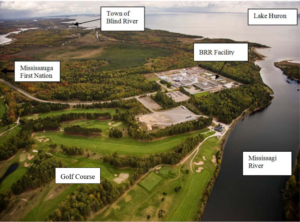Mississauga First Nation intervenes in Cameco application for license renewal

By Leslie Knibbs
MISSISSAUGA #8 FIRST NATION— Representatives from Mississauga #8 First Nation (MFN) attended the Canadian Nuclear Safety Commission (CNSC) hearing on Nov. 24, 2021, to present their submission as interveners on Cameco’s application for a 10-year license renewal to process uranium for nuclear energy. Because of its close proximity to MFN and its presence on the traditional territory, members of the community along with the Chief and Council are keen on opening up constructive dialogue between Cameco and MFN to address their concerns.
Weeks prior to the hearing, workshops took place on Nov. 4 in MFN to engage the community on Cameco’s application for renewal of their license to continue operation in the refinery process of uranium for nuclear energy. Community members were encouraged to attend the Nov. 4 workshops. With a total membership of 1,371 and an on-reserve community of 325 people, 40 community members attended in-person and those who could not attend in-person could still interact and join the discussion virtually via livestream. MFN is concerned with the consultation process, or lack of, as well as the environmental impact of the facility which is located one mile from their on-reserve community.
Cameco’s Blind River operation has been involved in the production of processed uranium since 1983, refining what is known as yellowcake; barrels of this are brought to Blind River’s Cameco from mines around the world. When refined, yellowcake becomes enriched uranium which is used primarily to manufacture nuclear fuel for nuclear power plants producing electricity. It can also be used in nuclear weapons. Cameco is one of the world’s largest providers of uranium needed to generate clean, reliable baseload electricity around the globe. Canadian and Kazakhstan operations have the licensed capacity to produce more than 53 million pounds annually.
As a result of the MFN community meetings, over 25 recommendations were formulated to present to the CNSC at the hearing on Nov. 24. Recommendations were all related to the environment and the need for consultation.
At the hearing on November 24, a research team led by Peyton Pitawanakwat, Laura Mayer, Brent Niganobe, Gloria Daybutch, and Kerrie Blaise presented their submission to the CNSC.
Both the Chief and Council supported the team’s presentation as recognition of the rare opportunity to engage Cameco on community-specific interests in a public setting according to a press release on November 25. Disappointed with Cameco’s application for a 10-year license, Laura Mayer indicated, “10-year license lengths diminish opportunities for information sharing, direct involvement, and engagement based on MFN’s (sic) right to govern traditional lands.”
According to CNSC Report, the position of the CNSC staff found there are no “new adverse impacts on Indigenous rights from [the] license renewal therefore duty to consult does not apply. Countering this, MFN stated, “[The] duty to consult has not been discharged, consultation is triggered when there are potential impacts; consultation is an ongoing obligation.”
“CNSC must uphold principles of the United Nations Declaration on the Rights of Indigenous People (UNDRIP). CNSC must discharge the duty to consult before making a license renewal decision.”
MFN has requested the CNSC to deny Cameco’s request for a 10-year license as the term will reduce or eliminate ongoing dialogue and opportunities for information sharing as well as diminish any “direct involvement and engagement based on MFN’s right to govern traditional lands.”
Amongst the 25 recommendations, MFN urged the CNSC to “direct Cameco to undertake cultural competency training, which includes skills-based training intercultural competency, human rights, and anti-racism. As well MFN appealed to the CNSC to “affirm their commitment to reconciliation, fully adopting UNDRIP, and supporting Treaty relationships based on the principles of mutual recognition and shared responsibilities.”
A decision from CNSC on Cameco’s application for a 10-year license renewal is expected by February 2022 when their current license expires.


